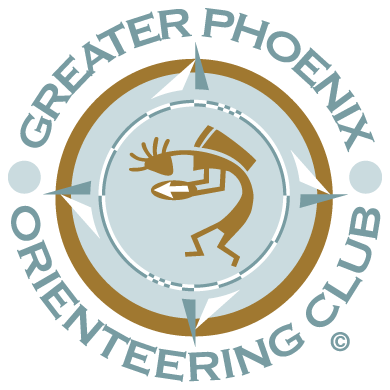
Orienteering Beginner's Clinic(This page provides a general description of the Greater Phoenix Orienteering Club's beginning orienteering training. The information here is general and may or may not apply to any specific event. Please see the individual event webpage for details of your specific event.) |
Summary:
| WHAT |
A hands-on course teaching basic map and compass concepts used for land navigation and the sport of orienteering. Participants learn techniques to navigate using only a map and compass (No GPS!) and practice the techniques outdoors on an orienteering course setup specially for beginners. For additional information about orienteering, see the Greater Phoenix Orienteering Club's website at gphxo.org. See the course outline here for more details about the beginning orienteering training. |
| WHERE | See the main event page for directions to the event site. |
| SIGN UP | You can sign up for the beginning orienteering training at the event site. |
| COST | Depending on the cost of our permit, the beginning orienteering training is either free or will cost $5 per person. |
Details:
|
We're very excited to offer a 1.5 to 2 hour beginning orienteering course for those who want to learn about the basics of orienteering. In the course, we'll introduce participants to concepts of navigation using only a map and compass. We'll then apply the concepts to navigate through a course shown on a map similar to maps we use at our orienteering events. The Beginning Orienteering training is open to participants of all ages and at all levels of skill and fitness. Our goal is to teach some of the basic navigation concepts that you can then use to participate in a future orienteering event. If you're looking for a fun new and different way to enjoy the outdoors, please consider signing up for our class. Course ContentStudents will walk up to four kilometers, with day packs, learning and practicing land navigation techniques used for orienteering. The field training covers compass use, interpreting topographical maps, and several methods of getting from point to point using only a map and compass. EquipmentIt is best if students can provide their own compass. The suggested model is a Silva Ranger 15 CL 360-degree compass. This model has a baseplate, a mirrored lid with a site, and a mechanical declination scale adjustment. Other compass models are also acceptable. We will provide compasses for those who do not have their own. CostThe cost for the Beginning Orienteering is either free or $5 to help cover the permit fee cost. We will provide participants with a) a topographical map of the class area, b) course materials, and c) several hours of orienteering instruction. We know you will be so excited about what you learn that you'll join us for one of our many orienteering events. (see gphxo.org) |
What to bring:
| Whistle | For any field training, participants are required to carry a whistle. Since orienteering involves navigating off-trail, participants can sometimes travel to areas that are rarely visited by other users of the area. The whistle is a safety precaution which allows orienteering participants to signal their presence to others in case of an emergency. |
| Compass | We prefer participants to bring their own compass. This will allow them to learn techniques during the training, then practice the techniques further at home. We will provide compasses to those who are not able to bring their own. |
| Sun screen. | For training done outdoors, we often continue up to mid-day. At this time, the sun can already be high enough to be a concern. Even though we are starting fairly early in the morning, we suggest you apply sunscreen to avoid burning. |
| Water | There will be water at the start/finish . However, as we could be out in the field for up to three hours, you may also want to bring your own water bottles or a camelback. |
|
Sturdy hiking shoes and long pants |
The training could involve hiking off trail, sometimes in areas with thick brush and different types of cactus. |
Directions:
See the main event page for directions to the event site.